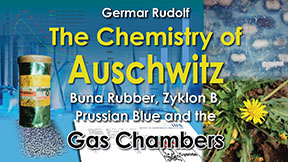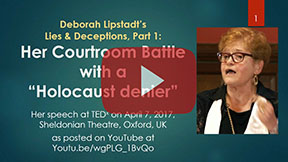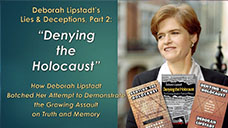Emotions were boiling over after my Expert Report had been published by General Remer in early 1993. Things subsided a little toward the middle of 1993, but then the entire thing got stirred up again, because I had sued the Max Planck Society for wrongful termination of my labor contract, and when the case was heard in early 1994, the media were there to report about it. The Max Planck Society published a press release in that context in an attempt to minimize the damage to its reputation – although I think that it did the exact opposite, as I have described in my Open Letter to them. Around that time I was also contacted by phone by a certain Alison Abbott, who claimed she was writing a news article for the prestigious science magazine Nature on the “Holocaust denial” scandal involving Germany’s most prestigious research association, which the Max Planck Society is considered to be. I remember to this day how I was struggling along trying to get my point across as she interviewed me. Back then my English was simply awful. A short while later Ms. Abbott published her article, indeed. See the transcript below or the PDF scan here.
Five years later, in 1999, I was living near Eastbourne at England’s south-eastern coast. In 1996, I had fled from the persecution I had to endure in Germany and had tried to settle abroad with my family. The latter part had failed, though, as my then wife left me with my two kids in early 1999 and announced several months later that she was filing for divorce. I was heartbroken. Nevertheless, I picked myself up and got back into the dating scene.
One event in this context deserves to be mentioned here. In the summer of 1999, I joined the Eastbourne Rowing Club under my false identity which I had assumed while living in England (Michael Martin). It so happened that a lady a few years younger than I was a member of that club as well. She was single, and so was I. She was looking, and so was I. We got closer, and all signs were indicating that this might become a promising romance. She had majored in science, and at that time was working for some pharmaceutical company, if I remember correctly. Before that, she had had some public relations job with some unnamed publishing outlet, but she had not liked the job, she stated. I cannot remember the reason she gave. This little romance ended when I incidentally mentioned that I had been married before and have two kids with my ex-wife. That turned her off, and that was the end of it.
Her name was Alison Abbott.
I connected the dots only a year or so later when the below Nature article fell in my hands again. At that time I had fled to the U.S.
NATURE, vol. 368 (7th April 1994), p. 483:
Holocaust denial research disclaimed
Munich.The Max Planck Society has reached an out of court settlement with a former graduate student whom it sacked last summer for producing research which “proved” that gassing of prisoners at Auschwitz concentration camp never happened.
The student, Germar Rudolf, was fired without notice from the Max Planck Institute of Solid State Physics in Stuttgart last June, after senior staff members found out that he had used his position at the institute to carry out the research, the results of which have been widely circulated by groups who deny that the holocaust took place.
The affair has left the Max Planck Society, which runs dozens of prestigious research institutes across Germany, angry that its name has been tarred by association with the holocaust denial movement, and Rudolf bitter that he gets no compensation and has little chance of finding another job. The March 22 settlement pays Rudolf no compensation, but rewords his dismissal as an “ending of the contract through mutual agreement”.
The story began several years ago when ex-Nazi general Otto Ernst Remer – who led the suppression of the putsch against Hitler in July 1944 – was charged with inciting race hatred. He had long campaigned for an end to what he calls the “Auschwitz lies”, claiming that the holocaust had not happened.
During his trial, his lawyer Hajo Herrmann commissioned Rudolf to conduct experiments which could be used to support Remer’s claim. Contact between the two had been established after Rudolf had a letter published in a newspaper about the Leuchter report, which had made claims that mass extermination could not have happened at Auschwitz.
At the time Rudolf had just started his PhD at the Institute for Solid State Physics, where he was initially considered to be a good scientist, earnestly concerned about Germany’s past, but not necessarily a fascist.
He travelled to Auschwitz in summer 1991, and took samples from the walls of one of the gas chambers and one of the delousing chambers. Using Max Planck stationary, he sent the samples to an analytical laboratory in Taunusstein, the Fresenius Institute.
Analysis showed no detectable cyanide in the samples taken from the gas chamber, but detectable cyanide in samples taken from the delousing chamber. These results formed the basis of a 120-page report in which he elaborated his theory – also based on an analysis of the structure of the gas chambers – that the gassings could not have taken place.
Whether Rudolf was paid by Remer’s lawyer for his work is not clear, although he was certainly given expenses. Rudolf had presented his report to the lawyer on the understanding that it would be used only in the court case and would not be distributed more widely. As it turned out, the report was not used as evidence in Remer’s trial.
But within weeks Remer had distributed the report, along with his own annotations, to a wide circle of addresses in Germany. He claimed that it had the support of the Max Planck Society. Rudolf halted the distribution by reminding Remer and Herrmann that the report was only for use at the trial.
But keen to publish his report without Remer’s political comments – which he claims to find offensive – he began in spring 1992 to seek a publisher himself. Having been turned down by most of Germany’s publishing houses, he finally sold the rights to Rüdiger Kammerer, a right-wing extremist, last May.
At that time its publication in Germany was illegal so Kammerer published the report, with a 16-page summary, in Brighton, England. Kammerer claims to have distributed over 10,000 copies.
The Max Planck Society is said to be extremely upset by the affair, and has been working to distance itself from the work since it heard about it last May. It is particularly annoyed, a spokesman says, about claims from right-wing groups that the Society supported the report’s findings and that Rudolf’s dismissal was orchestrated by the Central Council for Jews in Germany – charges which the society vigorously denies.
Last week it issued a statement saying that it supports the German Supreme Court’s ruling that the mass murders of Jews in concentration camps is a historical fact that needs no further proof.
A spokesman for the society says that even if the samples sent to the Fresenius Institute were genuine, Rudolf’s interpretation of the data is invalid because there are so many unknown factors involved, such as whether or not the chosen chamber was one of the many known to have been rebuilt before the allied troops entered the camp, or whether residues in the delousing chamber could have remained because much higher concentrations of cyanide were used to kill lice.
The Institute for Solid State Physics dismissed Rudolf without notice on 7 June, saying that he was wrong to use the institute’s facilities for work which would bring it into disrepute. It said that Rudolf had misled the Fresenius Institute by implying that the samples were related to work at the Max Planck institute, because he had used institute notepaper.
But Rudolf argues that several people at the institute had known of his work for more than a year before the dismissal, including his supervisor Hans Georg von Schnering, who, he claims, was sometimes supportive. He says the work was done in his free time and the Fresenius institute knew from telephone conversations that his work was independent.
He is bitter about the dismissal, and the publicity around it which has made it impossible for him to find a job. He is also angry that the University of Stuttgart is refusing to consider his submitted thesis, and that no-one will discuss with him the scientific content of his report.
“My only chance now is to prove that I am right”, he says, and he is now working with around 20 people from different countries on doing just that.
He refuses to talk about the political implications of his work, claiming that he is only interested in “the truth”. Von Schnering admits that he knew of Rudolf’s work, but says that the clause in Germany’s constitution, guaranteeing freedom of research, prevented him from reporting to senior staff at the institute what Rudolf was doing in his spare time. “Rudolf was a good student scientifically, but the conclusions of the report were all wrong,” he now says.
Neither side intend[s] to take the dismissal further. But Rudolf’s new allies from the extreme right plan to publish the report in several other languages including English, Japanese and Russian. “Our motivation is to spread the truth,” says Kammerer. Last month a German court, in a case brought by the leader of the right-wing National Democratic party, overturned a ruling that the report could not be published in Germany.
Alison Abbott






